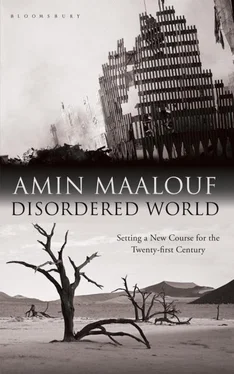This is a worrying change, which it seems to me is explicable by the combined effect of major upheavals such as the failure of ideologies, which favoured the rise of assertions of identity and of those who advocated them; the computer revolution, which enabled solid and immediate links beyond all borders to be forged across seas, deserts and mountain ranges; and the rupture in the balance between power blocs, which posed a sharp question about power and its legitimacy at global level. In addition, the emergence of one dominant superpower, long seen as the champion of a single ‘tribe’, probably contributed to giving strategic rivalries a strongly identity-based association.
It is in the light of all of these factors that I can say, thinking in anguish of Lebanon, my homeland: ultimately, communitarianism was a dead end. Our fathers’ generation should never have got swallowed up in it. Then I add in the same breath, this time thinking of France, my adoptive country, and of all of Europe, which is today the land of my last hopes: it is not in ‘communitarianising’ immigrants that you will facilitate their integration and escape the clashes which are looming, but by restoring social dignity, cultural dignity, linguistic dignity to each person, and by encouraging him to adopt his dual identity and his role as a link with equanimity.
More than once without dwelling on it I have criticised the notion of a clash of civilisations. Perhaps I should now pause a moment for a fairer, more balanced assessment.
What is problematic in this theory which has had so much media attention is not its clinical diagnosis. Its interpretative framework does allow greater understanding of events since the fall of the Berlin Wall. Since identity politics gained the upper hand over ideologies, human societies have often reacted to political events according to their religious affiliations: Russia has become openly Orthodox; the EU sees itself implicitly as a group of Christian nations; the same appeals to combat reverberate in all Muslim countries. Consequently, it is not unreasonable to describe the contemporary world with reference to spheres of civilisation which are in conflict.
In my view, where supporters of this theory go wrong is in departing from their observations of the present to construct a general theory of history. To explain to us, for example, that the current predominance of religious affiliations is the normal state of the human species, to which it has returned after a long detour through a series of universalist utopias; or that the clash between civilisations is the key which allows us to decipher the past and predict the future.
Every theory of history is the child of its time. It is highly instructive as a tool for understanding the present. When applied to the past, it reveals itself to be approximate and partial. Projected on to the future, it becomes risky and sometimes destructive.
To see in today’s conflicts a clash between six or seven great civilisations — Western, Orthodox, Chinese, Muslim, Indian, African, Latin-American — is enlightening and intellectually stimulating, as is evidenced by the number of debates it has given rise to. But this key does not help us much to understand the great conflicts of human history: think only of the First and Second World Wars, which were principally quarrels among westerners and which nonetheless shaped the world we all live in. And it does not help us to explain monstrous phenomena which have weighed on our contemporary moral consciousness, such as totalitarianisms of the left as well as the right, or the Holocaust; and that is not even to mention the great global confrontation between capitalism and communism which — from Spain to the Sudan, and China to Greece, Chile and Indonesia — has profoundly divided societies belonging to all civilisations.
More generally, when you look at various episodes of the recent or distant past, you find in every period events such as the crusades, which do indeed seem to reflect a clash of civilisations. But you also find that many others which are just as significant and just as deadly occur within the Western cultural sphere, or the Arab-Muslim, African or Chinese one.
Even in our own era, which seems by and large to conform to the academic schema of a clash of civilisations, an event like the Iraq War clearly has several different facets: that of a bloody conflict between the West and Islam; that of a yet more bloody conflict within the Muslim world itself, between Sunnis, Shi’ites and Kurds; and that of a clash between great powers around the question of global hegemony.
History, being composed of an infinity of individual events, fits badly with generalisations. In order to find your way, you need a large bunch of keys; and if it is legitimate for a researcher to want to add the key he has forged himself, it is unwise to want to replace the whole bunch with a single key, a passkey which is supposed to open every door.
The twentieth century made abundant use of the key offered by Marx and we now know what excesses that was capable of leading to. Class struggle doesn’t explain everything, and neither does the clash of civilisations. Not least because the words themselves are ambiguous and deceptive. If everyone has a feeling of social belonging which brings about class solidarity and also certain class hatreds, the contours of this notion are fuzzy. At the time of the industrial revolution, it was reasonable to think that the emerging proletariat would become conscious of its identity, which would function as a distinct identity, as a ‘class’, and play a determining role in history until the end of time.
Could one say exactly the same of the new key provided by ‘the clash of civilisations’. If everyone has a feeling of religious or ethnic belonging which brings about certain feelings of solidarity towards a civilisation, as well as the hatreds that go along with it, the contours of this notion are no less fuzzy than those of class. Today the zeitgeist leads us to believe that civilisations are defined entities, more and more conscious of their uniqueness, and that they will play a determining role in human history.
There is of course an element of truth here. Who could deny that Western civilisation is not to be confused with Chinese or Arab-Muslim civilisation? But no civilisation is watertight, none is immutable, and today the borders are more porous than in the past.
For millennia, our civilisations have been coming into being, developing, changing; they have come into contact and opposition with each other, imitated each other, differentiated themselves, allowed themselves to be copied; then, slowly or abruptly, they disappear or merge with others. Roman civilisation joined that of Greece one day. Each of them retained its character, but they also achieved an original synthesis which became a major element in European civilisation. Then Christianity came along, born in quite a different civilisation — principally Jewish, with Egyptian, Mesopotamian and more general Levantine influences — and became in turn an essential constituent of Western civilisation. Then the so-called barbarian peoples arrived from Asia — the Franks, Alamans, Huns, Vandals, Goths, all the Germanic peoples, the Altaics and the Slavs — who mixed with the Latins and Celts to form the nations of Europe.
Arab-Muslim civilisation was shaped in the same way. When the Arab tribes, including that of my ancestors, left their barren desert peninsula, their civilisation was schooled by Persia, India, Egypt, Rome and Constantinople. Then from the borders of China the Turkic tribes arrived, whose leaders remained our sultans and caliphs until after the birth of my own father, before being overthrown by a modernist nationalist movement which wanted to anchor its people firmly to European civilisation.
Читать дальше












